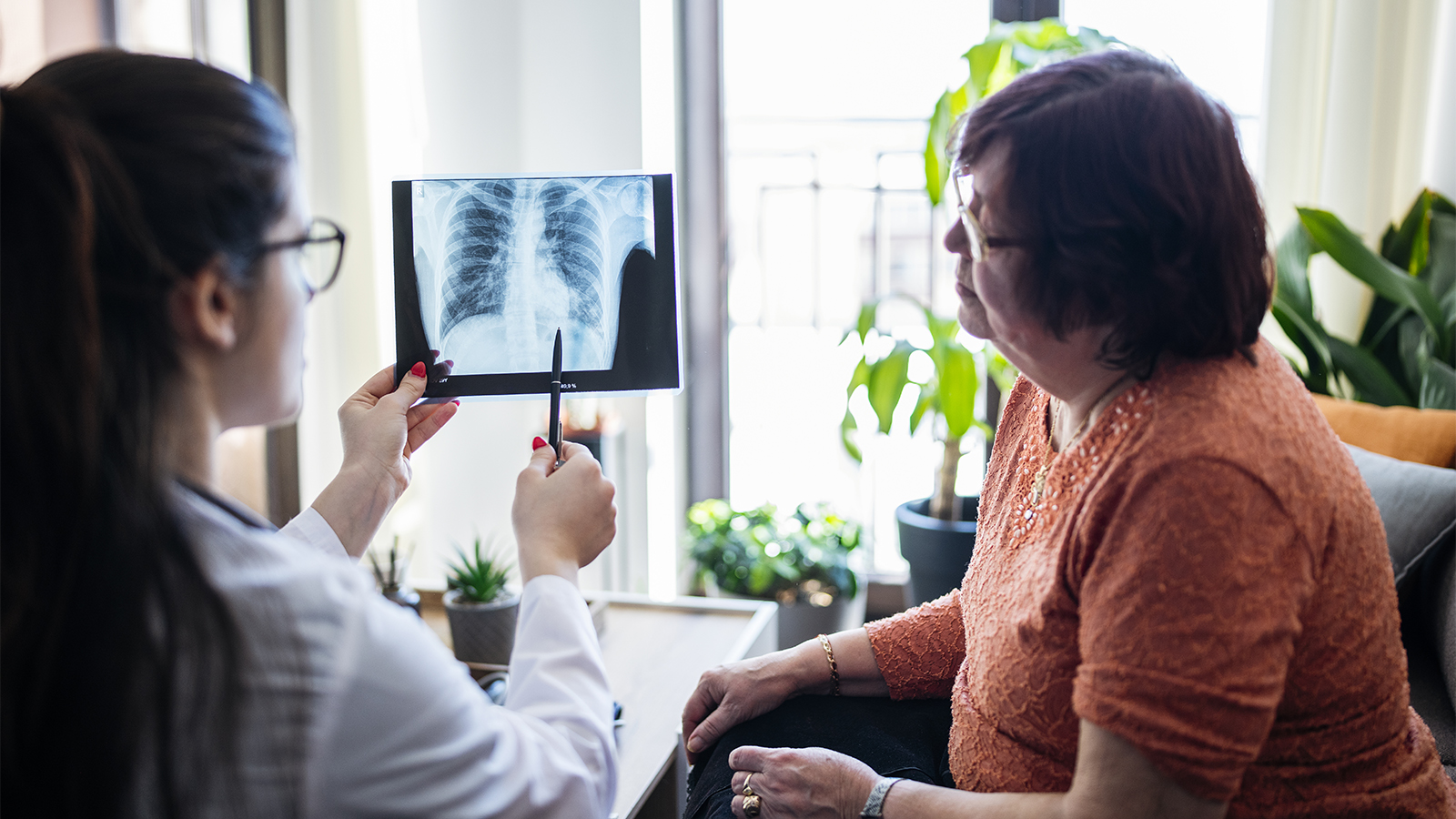Surprising Symptoms May Signal Stroke In Women
Did you know that the sudden fatigue or headache you're feeling could be the symptom of a stroke? Learn about the signs of stroke in women and the importance of rapid treatment.

By Delcine Sood, DO, FACC, Cardiologist—Virtua Cardiology
How many times have you been so exhausted you felt like you were walking around in a fog, or had a sudden, severe headache? Like many women, you probably just brushed it off as part of the daily juggle of work and home.
What’s surprising is that these feelings can be signs of a stroke in women. As with a heart attack, women can have different symptoms of stroke than men. For example, women may have more vague, atypical symptoms—like confusion or general weakness—rather than weakness on one side of the body.
What Is a Stroke?
A stroke occurs when the blood supply to the brain is cut off. This “brain attack” can cause brain cells to die, resulting in serious consequences—such as paralysis, trouble speaking, problems thinking, and death.
Stroke is the third-leading cause of death for women. Each year, 55,000 more women suffer a stroke than men.
What Are the Traditional Signs of Stroke in Women and Men?
The “classic” warning signs of stroke in women (and men) often can be noticed by others around you. They include the following sudden symptoms:
- Weakness or numbness in the face, arm, or leg—especially on only one side of the body
- Poor balance and/or stumbling
- Dizziness
- Slurred speech or trouble speaking or understanding others
- Severe headache with no apparent cause
- Vision problems in one or both eyes
What Are the Unique Signs of Stroke in Women?
Some women experience other, understated symptoms that they dismiss or may be hesitant to seek medical attention for. These different signs include:
- Loss of consciousness or fainting
- General weakness
- Difficulty breathing or shortness of breath
- Confusion, unresponsiveness, or disorientation
- Sudden behavioral change
- Agitation
- Pain
- Hallucination
- Seizures
- Nausea or vomiting
- Hiccups
How Can You Tell the Difference Between Signs of Stroke and Something Else?
So how can you tell that general exhaustion isn't just being overworked, or that vomiting isn't the result of an upset stomach from lunch?
The key is that these symptoms appear suddenly, or as a change in body function that you can’t readily explain.
Don’t hesitate—call 911
Minutes matter during a stroke, so it’s important to be aware of all the possible symptoms you may experience, not just the more well-known ones.
Remember, the longer you take to get effective treatment, the more brain tissue dies and the worse your outcome will be. Don’t take the chance. Call 911 right away.
Stroke Care You Need Close to Home
Through the Penn Medicine | Virtua Health Neurosciences Program, our stroke team performs the most advanced procedures to treat a stroke. Learn more about stroke care at Virtua.
There's So Much More to Explore
Discover expert insights, inspiring stories, health tips, and more by exploring the content below!

Understanding Food Addiction: Causes, Symptoms, and Recovery Strategies

The Weird Pregnancy Side Effects No One Tells You About

10 Hand Washing Tips to Keep You Healthy All Year

How the Unique Stages of a Woman's Heart Affect Her Health

Cervical Cancer Screening Guidelines: What You Need to Know

HeartTalk Magazine

How to Spot the Early Signs and Symptoms of a Stroke

How Weight-Loss Surgery Can Improve Diabetes, Heart Health, and More

How to Achieve Your Health Goals This Year

Knee Replacement Rehab: 7 Exercises to Restore Your Strength and Range of Motion

Caregiving During the Holidays: Ways to Manage Stress and Find Joy

Bioidentical Hormone Replacement Therapy Pellets: Relief for Menopause and Andropause Symptoms

Why Is Sex Painful During Pregnancy? Pelvic Congestion Syndrome Explained

COVID-19 Vaccines and Pregnancy: FAQs

COMFORTing Tips to Avoid Holiday Heartburn

How to Tell the Difference Between Cold, Flu, and COVID-19

From Exhaustion to Empowerment: Tracy's Hormone Replacement Therapy Success Story

Daily Wellness Checklist: Simple Habits for Feeling Good Inside and Out

Sexual Health FAQs: The Questions Everyone’s Too Embarrassed to Ask

3 Reasons Why Now's the Time to Find Relief From Varicose Veins

The Brain Health Checklist: 11 Questions Everyone Should Ask

How to Get and Stay Healthy This Fall

How to Reverse Prediabetes and Prevent Type 2 Diabetes

6 Ways to Get More Out of Your Daily Walk

Young Breast-Cancer Survivor Has New Hope for Healthy Future

What To Know About Vaginal Discharge During Pregnancy

Is Cancer Hereditary? What You Need to Know About Your Genetic Risks

Tara's Story: From Debilitating Uterine Fibroid Pain to a Half-Marathon Medal

Is Your Post-Pregnancy Belly Bulge a Sign of Diastasis Recti?

Your Guide to Mammograms: When to Get Screened and What to Know

The Top 10 Foods That Boost Your Brain Health

Is It Safe to Exercise During Pregnancy?

Prevent Yard Work Injuries: Tips for Mowing, Gardening, and Raking

Healthy Weight Gain During Pregnancy: A Guide for Moms-to-Be

How to Curb Nighttime Snack Cravings

Is Your Daily Walk Making You Really Sore?

IBS and Alcohol: Can You Still Enjoy a Drink?

What You Need to Know About Epilepsy

'Feeling Joy Again': ECT Brain Stimulation Therapy Restores Ashley's Well-Being

How High Blood Pressure Affects Your Body

Not Just for Wrinkles: Botox Injections Promote Improved Bladder Control

Caring Maternity Team Transforms Harley's Pregnancy Crisis Into Lasting Memories

Robotic Hysterectomy, Trusted Care Help Bobbi Shine Again

Easy, Healthy Lunch Ideas for the Beach

How to Stay Cool and Prevent Heat Illness All Summer Long

Do Not Get Burned by These Sunscreen Myths

Beat the Bugs and Save Your Summer

How to Have a Healthy Pregnancy if You're Overweight

Why You Get Sick on Vacation (and How to Stay Healthy While Traveling)

6 Hot Tips for a Safer Summer

4 Surprising Health Truths You Should Know

5 Interesting Facts About Your Heart

Is Low Sex Drive Normal? Revealing the Complex Causes of Low Libido in Women

Get to the Bottom of Blood Pressure Numbers

CABG Surgery: What Women Should Know About Heart Health and Healing

5 Feel-Good Activities to Explore Around South Jersey

Stress Incontinence vs. Urge Incontinence: What's the Difference?

3 Changes You Can Make Today to Lower Your Cancer Risk

A Lung Cancer Screening Could Save Your Life

Take Pride in our Health: Must Dos for LGBTQ+ Preventative Care

4 Foolproof Pelvic Floor Strengthening Exercises for Women

What to Expect During Perimenopause

Protect Yourself From Tick Bites and Lyme Disease

10 Quick Ways to De-Stress

4 Ways to Stay Fit and Healthy on a Budget

Do You Know the Signs and Symptoms of Uterine Fibroids?

How Are Uterine Fibroids Treated?

Can I Have Sex After a Hysterectomy?

From Restless to Restful: How Movement Improves Sleep

5 Simple Ways to Spring Clean Your Wellness Routine

What to Expect From a Robotic Hysterectomy

When You Need A Hysterectomy Know Your Options

Take Control of Incontinence, Prolapse, and Other Pelvic Floor Disorders

How Can I Prevent Bone Loss and Osteoporosis?

What Should You Do if You Slip, Fall, and Hit Your Head?

The Truth About Menopause, Weight Gain, and Belly Fat

Shedding Light on Lesser-Known Menopause Symptoms and Solutions

Debunking The Myths About Vaginal Dryness

What You Need To Know About Stroke Treatment

Best Foods for Kidney Health

5 Essential Winter Foot Care Tips When You Have Diabetes

Advanced Minimally Invasive GYN Surgery Puts You at the Center of Care

Your 10-Point Plan to Avoid Winter Weight Gain

Colitis Symptoms Under Control, Jennifer Is ‘Living My Best Life’

Surprising Symptoms May Signal Stroke In Women

8 Key Steps to Better Blood Pressure Control

5 Back Stretches for the Work-From-Home Workweek

The HPV Vaccine: A Powerful Shield Against Cervical Cancer

How Does Breast Density Affect Your Mammogram?

Menopause: New Insights Into the Power of Hormone Replacement Therapy

How to Prevent and Treat Urinary Tract Infections

One New Heart Valve Saves Two Lives in the Tritten Family

6 Numbers Key to Keeping Your Heart Healthy

4 Easy Ways to Treat and Prevent Runner's Knee

Breast Cancer Diagnosis Inspires Catherine to Help Others

Quick Action Leads to Jesse's Recovery From Stroke

Five Mindfulness Tips That Can Help Heal Your Heart
Working from Home? Take a Quick Break to Stretch Your Wrists

Watchman Heart Device: a Technological Breakthrough for Blood Clot Prevention

Love Your Heart: Essential Care Tips for Every Stage of Life

How Do I Measure My Blood Pressure at Home?

How Do I Improve My Cholesterol Levels?

3 Ways to Reduce Your Stroke Risk

Sarah Wins Back Her Health After Crohn's Disease Diagnosis

A Breast Self-Exam Saved Kristen's Life

How Sex Keeps You Healthy as You Age

Protect Your Child From HPV and Related Cancers

Why IUDs Might Be The Most Effective Birth Control

5 Things You're Too Embarrassed to Tell Your OBGYN

